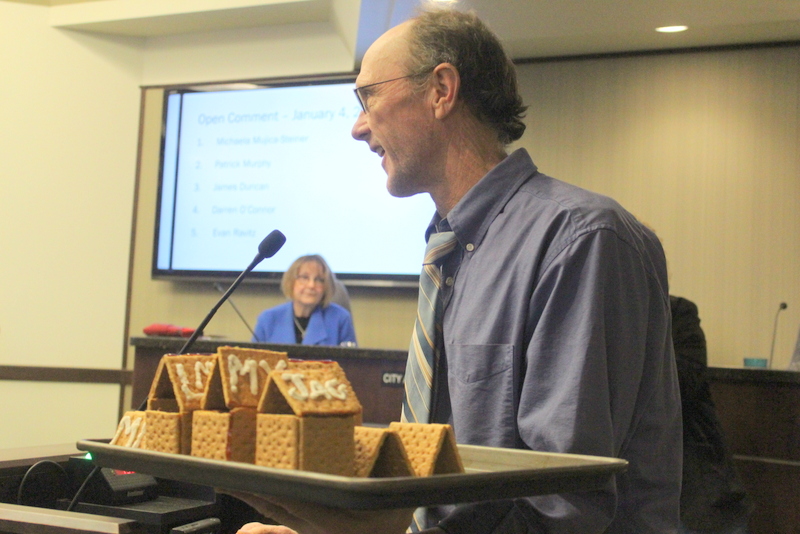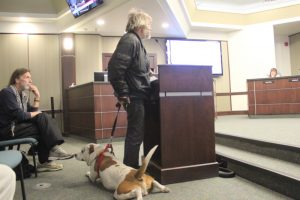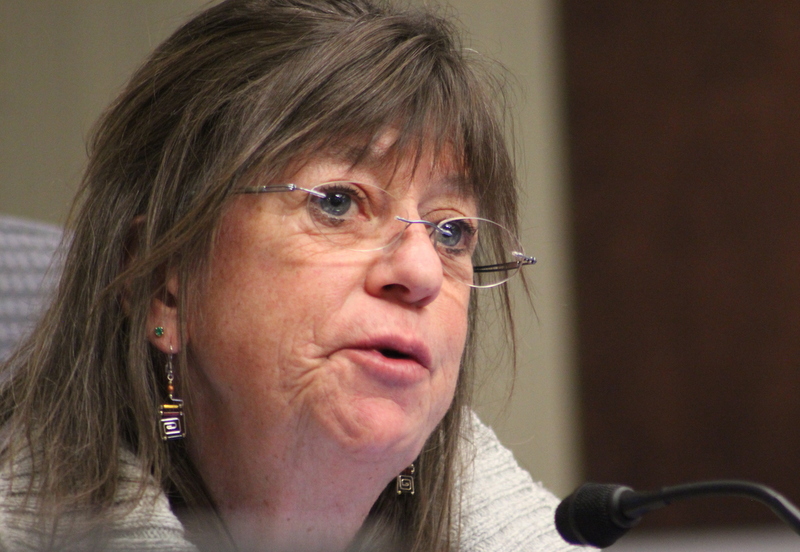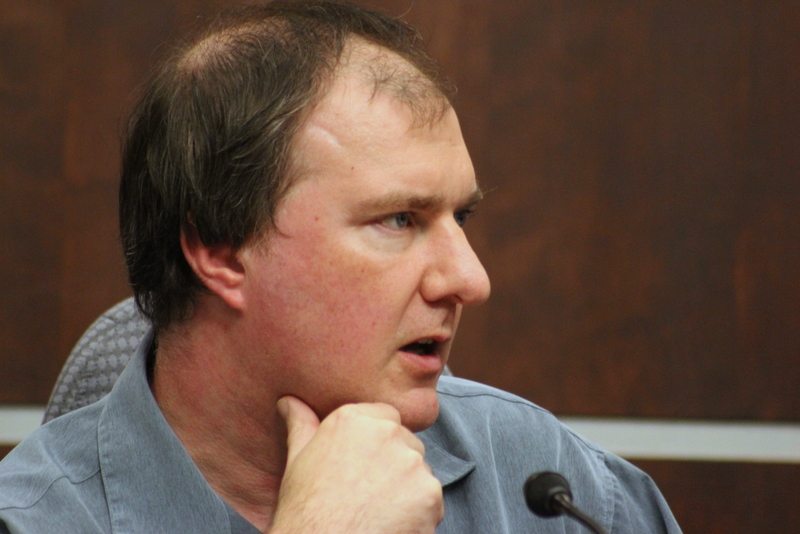
James Duncan of Boulder offers Boulder City Council a model of a tiny home village as a gift on his birthday. Duncan, a member of Boulder Rights Watch, advocates for the idea of tiny homes as one solution for those who can’t find safe shelter on cold nights or who need temporary dwelling. Duncan sang his version of “Happy Birthday” to Council, “Homes and shelter for you. Homes and shelter for me. Homes and shelter for everyone. Homes and shelter for all.”
Those wanting Boulder City Council to address the holes in the new approach providing services to those living on the streets dominated the open comment session of Thursday’s Boulder City Council meeting.
Most speakers referenced the Christmas Eve death of Boulder resident Benjamin Harvery who is thought to have frozen to death in Boulder on a 10 degree night after he reportedly was denied access to his mail from the Boulder Shelter for the Homeless. Friends say he was expecting an envelope with money from his father which he was planning to use for a hotel stay.
A memorial was held Sunday for Harvey in front of downtown Boulder’s Bandshell where those seeking protection from the elements can often be seen.
Some speakers were critical of past council decisions and practices as was Boulderite Evan Ravitz who specifically named former Councilmembers Matt Applebaum and Andrew Shoemaker as barriers to a more humane policy to serve those experiencing homelessness, “The Councilmen’s departure is a big opportunity for you to drop Boulder’s half century of war on the homeless with its many deaths, frostbite and amputations. The city gives lip service to the known success of “housing first,” but only provides a few dozen units, while prohibiting people from housing themselves with tiny homes or camping.”
Immigrant to Boulder Jill Story said that on first glance, it appeared that Boulder is taking care of its homeless population judging from the appearance of Boulder’s Shelter for the Homeless, but upon deeper investigation, she changed her impression, “One of the things I brag about to the people when I saw the homeless shelter is, ‘Boulder takes care of its homeless’ and then I found out the hard way that we really don’t.”
Story referenced a 2016 report titled Too High a Price resulting from a 2016 study conducted by Sturm College of Law at the University of Denver, “It talks about the criminalization of homelessness and how we ticket our homeless for daring to have a blanket at night when they’re sleeping. You’re allowed to sleep outside 365 days a year as long as you don’t have a blanket or a sleeping bag which seems really outrageous to me. Homeless individuals without a place to rest are being criminalized for a basic human need: sleep.”
Although city officials say that Harvey had been banned by the Shelter for a year due to a “behavioral” issue, speakers at Thursday’s city council meeting suggested that no barriers should prevent someone from staying safe for the night in freezing temperatures.
Earlier in the year, the city changed the services it provides for shelter, which it dubbed “coordinated entry,” offering emergency services when the temperature dips to 20 degrees and below in dry conditions, and 32 and below with precipitation. Some on council questioned from where and when those temperature policies were derived.
“How did we end up where we are?” questioned Councilmember Sam Weaver, “Who set the criteria?”
Those questions followed testimony by Boulder resident Mike Homner who presented information from the Center for Disease Control describing conditions that can onset hypothermia at above 40 degrees, “We need to take a step back and look at what we’re doing, at what temperature were doing it,” Homner testified, “Just because another city does it one way, doesn’t mean it’s the right way I implore you to turn around and look at those numbers. Benjamin Harvey didn’t have a best practice day because of the shelter not being open.”
Director of Human Services Karen Rahn argued that “Hypothermia can happen at virtually any temperature and condition.” Rahn acknowledged the difficulty to use hypothermia risk standards as a gauge on whether to operate emergency shelters, “When BOHO was operating, one of the things that was mitigated against this very issue was, they were operating every night during the major portion of the sheltering season. So that meant you didn’t have to think about weather triggers.” Boulder Outreach for Homeless Overflow(BOHO), which provided nightly shelter service at area churches, suspended operation in May of 2017. Rahn said that cost contributed to the suspension of services, “It was growing pretty significantly, and we were putting more and more resources into the day-to-day sheltering that wasn’t tied to programs and services.”
The cost though was something that speakers wanted council to weigh against the cost of a human life as was voiced by Boulder Rights Watch member Darren O’Connor, “I think the amount of money that we save by keeping the severe weather shelter closed leads to confusion. It leads to death. It’s unconscionable to save whatever were saving. The churches, the synagogues are already saving their space every night reserving it for these things in case it is open. So let’s do it!”
 Boulder resident Leo Gerald Scott who identified himself as currently experiencing homelessness said, “There’s no excuse for Boulder to let people die. There’s no reason for anyone to die because of these temperatures.” Scott who appeared with his dog expressed perplexity at city ordinances which he challenged, “Animals have more rights than we do. We’re their caretakers as far as what Boulder says. Yet we can’t let them die, but we can die?”
Boulder resident Leo Gerald Scott who identified himself as currently experiencing homelessness said, “There’s no excuse for Boulder to let people die. There’s no reason for anyone to die because of these temperatures.” Scott who appeared with his dog expressed perplexity at city ordinances which he challenged, “Animals have more rights than we do. We’re their caretakers as far as what Boulder says. Yet we can’t let them die, but we can die?”
Scott was referring to city ordinances that O’Connor also referenced, “Ordinance 617 says you must shelter your pet and [Ordinance] 5610 says you can’t shelter yourself. People on the street could theoretically be ticketed for not caring for your pet, but [can be ticketed for] wearing a blanket themselves.”
In Boulder, those who are found using a blanket, sleeping bag, tent, tarp, or any other shelter can be ticketed for violating what is referred to as Boulder’s “camping ban.”
Advocates for homeless rights have long appealed to the city to stop enforcing the ban, and to stop arresting and ticketing people who are sheltering because of the additional hardship that a criminal history, and the associated fines pose to those who already face challenges on the street. And because of the cost to jail someone.
 In Boulder finding a bed at Boulder Shelter for the Homeless once meant that people who were looking for shelter for the night had to find internet in order to reserve a bed as described by resident Kevin Beck, a friend of Harvey’s, “There was a policy that if people wanted to get a bed, they had to register online. And we’re talking about a population of people that largely doesn’t have internet access.” The policy has been changed to a lottery system to access a bed at the Boulder Shelter for the Homeless, but Beck pointed to continued flaws in the system, ” If you look at the last couple of years that Boulder’s tried to address the homeless problem, it’s just very fragmented. Organizations come and go. This was going to be the first winter in which people could stay at the shelter all day if they chose to, but that fell through.”
In Boulder finding a bed at Boulder Shelter for the Homeless once meant that people who were looking for shelter for the night had to find internet in order to reserve a bed as described by resident Kevin Beck, a friend of Harvey’s, “There was a policy that if people wanted to get a bed, they had to register online. And we’re talking about a population of people that largely doesn’t have internet access.” The policy has been changed to a lottery system to access a bed at the Boulder Shelter for the Homeless, but Beck pointed to continued flaws in the system, ” If you look at the last couple of years that Boulder’s tried to address the homeless problem, it’s just very fragmented. Organizations come and go. This was going to be the first winter in which people could stay at the shelter all day if they chose to, but that fell through.”
Other policies that the public wanted council to address were having a consistent location for emergency shelter, and bans and suspensions from accessing shelter. Maria Krenz of Boulder was especially critical of the Boulder Shelter for the Homeless when she addressed council, “Under the revised contract with the city, which the Shelter may not have signed yet, their responsibility is to shelter the chronically homeless, not to teach them discipline and expose them to find their way on a 10 degree night.”
Councilmember Sam Weaver had the same thought about the timing for negotiations, “This is the moment in time when we have the most leverage to get what we want out of the Shelter, I feel like because they need the use allowance from us, and we’re negotiating their management plan now.”
The Right to Rest Act will be introduced in the Colorado legislature for the fourth time by Representatives Jovan Melton and Joseph Salazar that if passed, would result in blanket protections for the homeless across the state.
Leo Gerald Scott suggested the reverse for Boulder that could be a model for the state, “The homeless need a Bill of Rights drawn up by Boulder that can later be passed on down to Colorado. Good examples are what California has been trying to do. And I beg Boulder. Please. We are people just like you!”
Boulder City Council will further discuss policies at its annual retreat Friday January 19, and Saturday January 20 at the Boulder Museum of Contemporary Art, 1750 13th Street. The meeting is open to the public although no comment is generally taken at retreats.

Councilmember Mary Young: “[We need to ]make it a policy that if someone has been banned and they come to the shelter for a bed to please call the police and have them go to emergency shelter because they’re in different locations, and people don’t know how to get there and which location is the correct one. About bus passes, to get from the North Boulder shelter to the new shelter when it is open, it would take two buses, and that would be quite difficult, so another solution would be very helpful.”

Councilmember Lisa Morzel: “We have to find some kind of a way so that when you go forward and come through “coordinated entry”, obviously [those experiencing homelessness] want to help themselves to get out of the place that they’re at. And so they’re making a good faith effort to come into the program, and they should, if they’re assigned to have a program bed at the Boulder Homeless Shelter, then they should have that bed. And the churches and synagogues are all over the community. People just don’t know [which is sheltering on what night]. And I think i’ts asking too much of that individual to know where to go. So I really would like to move forward, and look at having only one [emergency shelter] so everybody knows what their role is, and what their job is, and what their responsibility is.”

Mayor Pro Tem Aaron Brockett: “But we’re changing the way our safety net is working here in town and we have to make sure that we don’t create new holes in that safety net. I’m concerned that there’s opportunity for people to fall through the cracks. I would really like for us to explore the possibility of like an ombudsman position, an advocate role.
But I feel like we do need some kind of backstop in order to support people if they feel like there’s been some unfairness [in being banned from the shelter]. We’re still negotiating the management plan, but I would like to see that put on the table as something to include in our relationship with the Shelter in one form or another.”